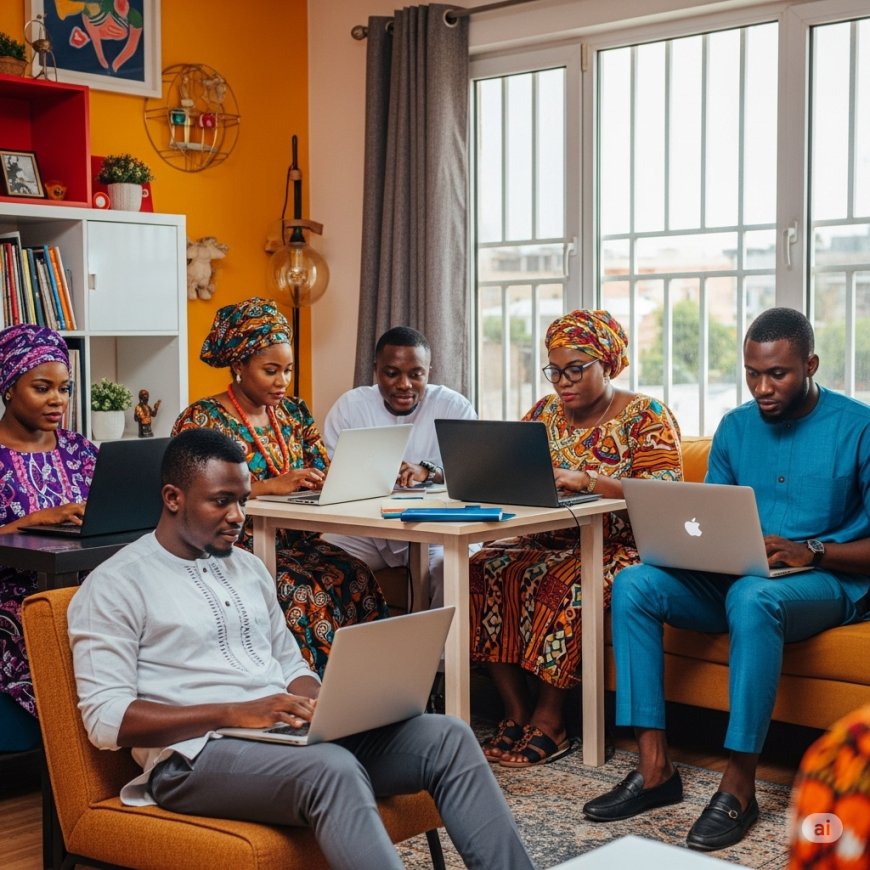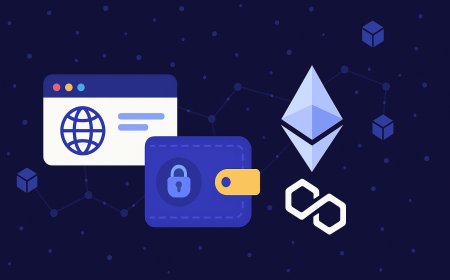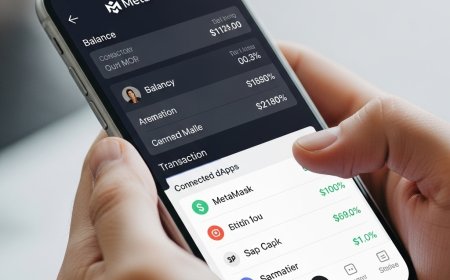How Nigerians Are Now Earning in Dollars From Home – And How You Can Too
Discover how everyday Nigerians are getting paid in USD by doing simple online work from home — and how you can start even if you’re a complete beginner.

More Nigerians than ever are landing remote jobs with foreign companies and collecting their pay in US dollars. This in-depth guide—free of hype—explains why global firms hire Nigerian talent, the exact roles that pay, realistic income figures, proven learning paths, where to find legitimate clients, and the pitfalls to avoid so you can start earning confidently from home.
1. Why Global Companies Actively Hire Nigerians
-
Cost efficiency – A US firm can pay a skilled worker in Nigeria roughly $500–$1 000 a month instead of $3 000–$5 000 locally and still keep the worker motivated.
-
English-speaking workforce – Nigeria is the largest anglophone nation in Africa; clients face no language barrier.
-
Time-zone overlap – Nigeria (UTC +1) overlaps several working hours with Europe, the UK, and a good part of the US morning.
-
Digital talent supply – Programmes like the federal 3 Million Technical Talent (3 MTT) initiative aim to train three million Nigerians in high-demand tech skills by 2027, expanding the local talent pool en.wikipedia.org.
Bottom line: Remote work is now mainstream, and businesses everywhere want reliable, lower-cost talent—exactly what many Nigerians can provide.
2. The Real Jobs Nigerians Are Getting Paid For
Below are the nine most common remote roles Nigerians perform for overseas clients, plus what each actually entails:
-
Virtual Assistant – inbox management, calendar scheduling, simple research, basic bookkeeping.
-
Content Writer / Copywriter – blog posts, website pages, email newsletters, ad copy.
-
Graphic Designer – social-media graphics, flyers, brand guidelines, basic motion graphics.
-
Web Designer / WordPress Implementer – install themes, customise pages, manage updates.
-
Social-Media Manager – plan content calendars, design posts, moderate comments, run ads.
-
Video Editor – cut long videos into reels, add captions, colour-grade, sync audio.
-
Customer-Support Agent – live chat or email support using tools like Zendesk or Help Scout.
-
Data-Entry / Spreadsheet Specialist – clean and import data, create simple dashboards.
-
Voice-over / Transcriptionist – narrate e-learning courses, transcribe Zoom meetings.
You only need to master one of these to break in; diversify later.
3. How Much You Can Actually Earn
-
Global benchmark: The average freelancer worldwide charges $28 an hour (up from $21 two years earlier) according to Payoneer’s latest income report payoneer.com.
-
African reality: Rates from Africa and Asia trend lower, but still rise each year; many Nigerian writers, designers, and virtual assistants now command $15–$25 an hour—the equivalent of ₦22 500–₦37 500 at today’s ₦1 500/$ rate anz.peoplemattersglobal.com.
-
Typical monthly range in Nigeria:
-
Beginners: $200–$600 (₦300 000–₦900 000)
-
Intermediates: $600–$1 500 (₦900 000–₦2.25 million)
-
Specialists: $2 000–$5 000 (₦3 million–₦7.5 million)
-
Remember, you set your rate; as your portfolio and client feedback grow, so will your earnings.
4. Skills to Learn First (and Exactly Where to Learn Them Free)
Choose one skill you enjoy, commit four to eight weeks, and use these resources:
-
Writing & Copywriting – Google Digital Skills “Content Marketing Fundamentals”; free HubSpot Academy courses.
-
Graphic Design – YouTube playlists on Canva and Figma; Adobe’s free “Creative Skills” series.
-
WordPress & Web Design – freecodecamp’s Responsive Web Design certification; LinkedIn Learning’s “WordPress Essentials” (free month).
-
Social-Media Management – Coursera’s “Social Media Marketing” by Meta; Hootsuite Academy fundamentals.
-
Video Editing – CapCut’s official YouTube channel; DaVinci Resolve beginners’ course.
-
Admin / VA Work – Google Workspace tutorials; tutorials on Trello, Notion, and Airtable.
Commit to hands-on practice: build a fake brand, redesign a friend’s business flyer, transcribe a church sermon—anything that produces portfolio pieces.
5. Proven Places to Land Foreign Clients
Freelance Marketplaces
-
Upwork
-
Fiverr
-
Freelancer
-
PeoplePerHour
-
Toptal (advanced vetting, highest rates)
Upwork alone has paid freelancers $25 billion+ since launch and now runs a skills-certification programme (49 % pass rate in 2024) that helps top profiles charge more upwork.com.
Remote-Job Boards
-
RemoteOK
-
We Work Remotely
-
Remotive
-
FlexJobs (paid, well-curated)
Direct Outreach
-
Optimise your LinkedIn headline for your service (“B2B Copywriter helping SaaS startups double blog traffic”).
-
Search for small agencies in the UK/US; send personalised cold emails with one concrete suggestion for their blog, site design, or workflow.
Nigerian Support Communities
-
Tekisite JobBoard Telegram (dev and product gigs).
-
Freelancing Nigeria Facebook group (60 000+ members).
-
3 MTT Learning Community forums (for tech learners).
6. Seven-Day Quick-Start Blueprint
-
Day 1: Pick one skill and define a niche (e.g., “email copy for e-commerce”).
-
Day 2 – 3: Complete at least five hours of foundational tutorials.
-
Day 4: Create three portfolio samples (mock or real).
-
Day 5: Set up your Upwork and Fiverr profiles—headline, bio, portfolio links.
-
Day 6: Submit 5–10 quality proposals (use the client’s name, reference their site, suggest one improvement).
-
Day 7: Join two Nigerian freelance groups; share your journey and ask for feedback.
-
Week 2 onward: Deliver, collect testimonials, raise rates 10 % every two to three projects.
7. Hard Truths & Pitfalls (Read Before You Start)
-
Lower starting rates – African freelancers often begin 20 % below global averages; factor that into your first six months.
-
Payment channels & fees – Learn Payoneer (1%–3 % fee), Grey or Chipper USD accounts, or a domiciliary account for wire transfers.
-
Power & internet costs – Budget for at least one backup: a 4G hotspot or mini-solar UPS. Nigeria’s average broadband penetration is 41.6 %; urban connectivity is solid, rural less so en.wikipedia.org.
-
Scams – Never pay upfront “registration” to a client. Use escrow systems on Upwork/Fiverr, insist on milestone payments, and verify job posts (BusinessDay recently listed six common remote-work scams targeting Nigerians) businessday.ng.
-
Taxes – Freelance income is “business income” under Nigeria’s Personal Income Tax Act (PITA). Keep invoices and set aside roughly 10 %–15 % for annual filing.
8. Case Snapshot – From NYSC Corp Member to $2 000-a-Month Writer
-
Month 0: Chidinma, 24, learned SEO writing on Google Digital Skills during NYSC in Port Harcourt.
-
Month 1: Wrote three sample blog posts; landed first Fiverr order at $30.
-
Month 3: Secured a long-term US marketing agency client via Upwork at $25/article, five articles weekly.
-
Month 7: Upgraded skillset with Surfer SEO and charged $60/article.
-
Month 9: Earnings averaged $2 000/month. Chidinma now coaches two other writers for free on weekends.
Takeaway: Consistency, niche focus, and continual skill upgrades beat raw talent every time.
9. What You Need to Succeed
-
One marketable skill.
-
Laptop or smartphone plus stable internet (budget ₦20 000/month).
-
Willingness to practise daily and accept small starter gigs.
-
Clear communication and reliable delivery.
-
Confidence to charge what you’re worth—then raise your rates.
10. Next Step – Grab Your Free Starter Kit
I’ve put together a Freelancing Starter Kit containing:
-
Ready-to-edit proposal templates.
-
Portfolio outline (Google Docs + Canva).
-
Daily job-application tracker (Notion template).
-
A curated list of 25 websites that post dollar-paying remote jobs, featured recently by BusinessDay NG businessday.ng.
Download the kit below
Files
What's Your Reaction?
 Like
0
Like
0
 Dislike
0
Dislike
0
 Love
0
Love
0
 Funny
0
Funny
0
 Angry
0
Angry
0
 Sad
0
Sad
0
 Wow
0
Wow
0






















